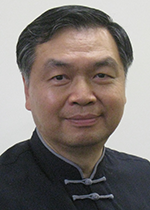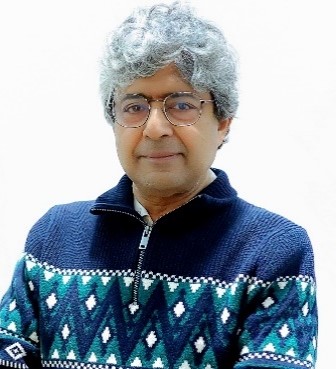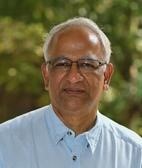Plenary speakers
Recent Research and Applications of Advanced Photomechanics Techniques

Wei-Chung Wang
Professor – Department of Power Mechanical Engineering of the National Tsing Hua University in Taiwan
Professor Wei-Chung Wang received his Ph. D. degree in Engineering Mechanics from Iowa State University in 1985. He is a fellow of and the former President of the Society for Experimental Mechanics (SEM), as well as a fellow of the Chinese Society of Mechanical Engineers of Taiwan. His recent research interests include experimental mechanics, fracture mechanics, thermal stresses, precision optical measurement and non-destructive testing.
Professor Wang has been an active participant and session/symposium organizer of various international conferences on experimental mechanics and has served in various capacities. He was advisor for the Ministry of Economic Affairs, Executive Director for the Tze-Chiang Foundation of Science and Technology and Director General of the Department of International Programs of the National Science Council. At the National Tsing Hua University (NTHU), he has served as the Associate Dean and Director of the Division of Academic Cooperation of the Office of Research and Development, Dean of International Affairs and Vice President for International Affairs as well as Global Affairs. Presently, he is the Senior Advisor for Global Affairs, Director of the Program Office for the Taiwan Education Center (TEC) in India and the Director for the Center for India Studies.
Professor Wang has also served in the editorial board of Optics and Lasers in Engineering, European Association for Experimental Mechanics, Regional Editor for Asia in The Open Mechanics Journal and is currently, the technical editor of Experimental Techniques. He is the recipient of the Pericles Theocaris Award, EURASEM in 2016. He is also the recipient of several awards of SEM: Frocht award in 2022 and Zandman and Tatnall Awards in 2015. He has received the Special Service Award for Accreditation Examination, Outstanding Service Award, Outstanding Engineering Professor Award by the Chinese Society of Mechanical Engineers as well as the K. T. Lee Management Medal from Chinese Management Association. At NTHU, Professor Wang has been awarded multiple times with the Teaching Excellence Award and has successfully supervised more than 100 graduate students. They are now serving in universities as professors, in research institutes as research fellows, in companies as senior managers and engineers.
Professor Wang has been a great friend of India and during the second wave of Covid in India, through his initiative, IIT Madras received ten Oxygen concentrators for distribution in India contributed by the alumni of NTHU.
Mechatronics in Medical Science and Biology

Subhas Mukhopadhyay
Professor - Mechanical/Electronics Engineering, Macquarie University, Australia
Professor Subhas Mukhopadhyay holds a PhD from India and Doctor of Engineering from Japan. His fields of interest include Sensors and Sensing Technology, Instrumentation, Wireless sensor networks, Internet of Things, Wearable sensors, Medical devices, Healthcare, Environmental monitoring, Mechatronics and Robotics. He is the Discipline Leader of the Mechatronics Engineering Programme and the Director of International Engagement. He has authored/co-authored 12 patents, 10 books and guest edited thirty-two special issues of international journals. He has supervised 55 postgraduate students and over 150 Honours students. He has organized over 20 international conferences as either General Chairs/co-chairs or Technical Programme Chair. He has received various awards, most notably: Best Performing Topical Editor of IEEE Sensors Journal from 2023, the Australian Research Field Leader in Engineering and Computer Science 2020, World Famous Professor by Government of Indonesia in 2018, Certificate of Distinction from IEEE Sensors Council in 2017, IETE R.S. Khandpur Award – India. He is a Topical Editor of IEEE Sensors journal, Associate Editor of IEEE Transactions on Instrumentation and Measurements and IEEE Review of Biomedical Engineering. He is the Editor-in-Chief of the International Journal on Smart Sensing and Intelligent Systems. He was a Distinguished Lecturer of the IEEE Sensors Council 2017-2022, fellow of IEEE(USA), IET (UK) and IETE (India). He is the Founding Chair of the IEEE Sensors Council New South Wales Chapter.
Challenges in Developing a Blood Pump as an Assist Device for the Human Heart

K. Muralidhar
Professor, Department of Mechanical Engineering, IIT Kanpur
Professor K. Muralidhar holds a PhD from University of Delaware (1985) with postdoctoral research experience at Lawrence Berkeley Laboratory, USA. He has conducted a wide range of experiments and performed numerical simulations in subjects related to fluid mechanics and heat transfer. His work has led to better understanding of intermediate Reynolds number jets and wakes, transport phenomena during growth of optical crystals, dropwise condensation over textured surfaces, and biomedical imaging of intracranial aneurysms.
His ongoing research interests include liquid-vapor interfacial phenomena and phase change, contact line dynamics, mechanistic modeling of disease progression and blood rheology. He is presently coordinating an institute-level initiative on developing a left ventricular assist device that will pave the way for a total artificial heart. Professor Muralidhar is the author of nine books including monographs on droplet dynamics and dropwise condensation, schlieren and shadowgraph imaging and has eight granted patents. He is the editor-in-chief of the Journal of Flow Visualization and Image Processing and is a Fellow of the Indian National Academy of Engineering, National Academy of Sciences, and the American Society for Thermal and Fluid Engineers.
Riding the Waves for Designing Innovative Experiments and Probing Material Behaviors

Ghatu Subhash
Newton C. Ebaugh Professor of Mechanical and Aerospace Engineering, University of Florida, USA
Professor Ghatu Subhash obtained his PhD from University of California, San Diego and conducted post-doctoral research at Caltech, Pasadena, CA. He has made seminal contributions to the field of experimental mechanics, especially in deformation behavior of ceramics and soft materials and has delivered specialized technical courses for practicing engineers/scientists on ‘Dynamic Response of Materials’ at General Motors, Johns Hopkins University, and American Ceramic Society (ACerS). His research was showcased in PBS documentary “Secrets of Spanish Florida” (aired in 2017) and unraveled the mystery behind the impact-resistance of Coquina (the material with which the oldest fort in the USA – the Castillo de San Marcos, St. Augustine, FL, was built) against cannon ball impacts during the seize by the British army in 1702.
Professor Subhash’s innovative contributions have been recognized by the 2024 James I. Mueller Memorial Award from ACerS and Conference Plenary Lecture, 2024 Murray Medal and the conference Plenary Lecture from the Society for Experimental Mechanics (SEM), SEM Lazan Award (2021) as well as Frocht Award (which recognizes the ‘Experimental Mechanics Educator of the Year’ 2018). He received the ‘Significant Contribution Award’ from the American Nuclear Society for developing an innovative processing scheme for net-shaped UO2 ceramic fuel and was awarded the University of Florida Doctoral Dissertation Advisor/Mentoring Award for his outstanding mentorship of students. For initiating numerous activities to promote ASME, he was awarded ‘ASME Student Section Advisor Award’. In recognition of his significant contributions to teaching, research, and student development, he received the ‘Ralph R. Teetor Educational Award’ from the Society of Automotive Engineers and ‘Outstanding New Mechanics Educator’ from the American Society for Engineering Education. Professor Subhash is a Fellow of ACerS, ASME, and SEM and currently serves as the Editor-in-Chief of Mechanics of Materials. He has mentored 41 PhD students and co-authored 220 peer-reviewed journal articles, 7 book chapters, 6 patents, and 2 books.
Dynamics and energetics in fish-like locomotion

Prof. Jaywant H Arakeri
Visiting Professor, Department of Mechanical Engineering, IIT Jodhpur
Prof Jaywant H Arakeri served as the faculty of the Mechanical Engineering department and the Centre for Product Design and Manufacture at the Indian Institute of Science, Bangalore till 2022. Currently, he is a visiting professor at IIT Jodhpur and an honorary professor at JNCASR, Bangalore. All his education has been in Aeronautical engineering, B.Tech (IIT Madras), ME (IISc) and PhD (Caltech). His research is primarily focused on the fundamental understanding of various phenomena in fluid mechanics and heat transfer, in particular related to turbulence, transition to turbulence, unsteady flows, bio-fluid mechanics and evaporation from porous media. Some of his recent research topics include the role of turbulence in condensation and droplet growth in clouds, flows around flexible surfaces like fish tails and heart valves, unsteady flows, like those found in arteries and related to pulsed propulsion, heat and moisture loss from soils and leaves, and precision agriculture. He has written several popular science articles in Resonance. He is an Editor-in-Chief of the journal Sadhana, and is a Fellow of the Indian National Academy of Engineering and Indian Academy of Sciences.